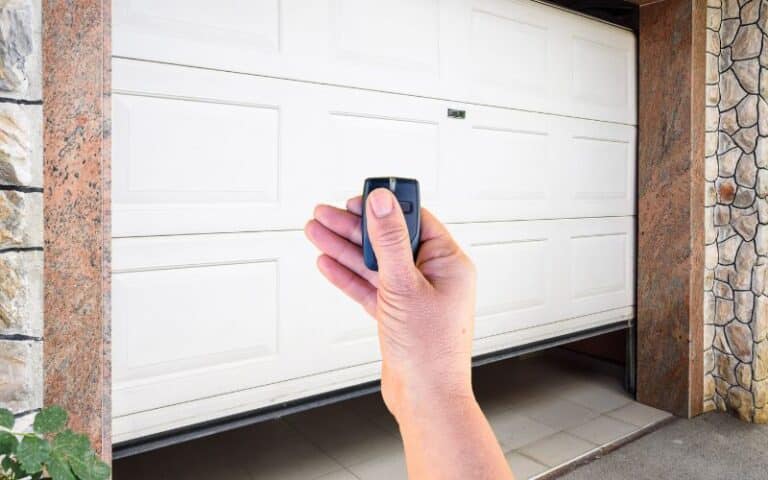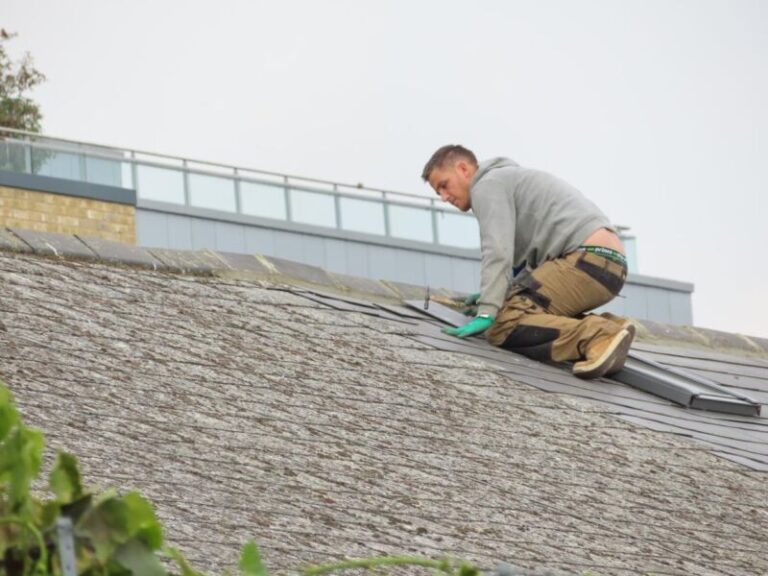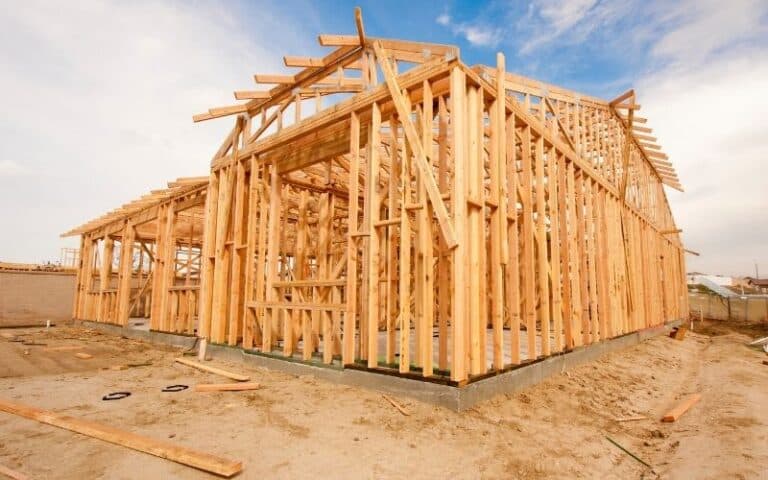If your roof is leaking and having other problems, it probably needs to be replaced.
However, you should know that if it’s a simple leak, you might not have to replace the entire roof but should still consider getting an evaluation by a professional to avoid unnecessary risks.
A professional will check your home situation, thoroughly evaluate your roof condition, and offer insights about what you need to do.
Let’s explore some reasons why your roof might need to be replaced.
Ready for a Roofing Quiz?
What is Meant by a Roof Replacement?
You might need to get your roof replaced if your roofing materials are coming off, and the replacement process involves tearing off the old shingles and underlayment to install new roofing components.
It’s not an ideal situation to be in, and having problems with your roof can be highly inconvenient, so you should prepare yourself to take corrective measures and follow the advice of the professional you hire.
By hiring a roofing contractor, you ensure that you get an expert opinion, which will let you know whether it’s essential for you to replace your roof or just fix it.
Although you minimize the chance of succumbing to possible errors by choosing the right contractor and investing in high-quality roofing materials, there is still a chance things can be wrong, making it crucial for you to take more interest in the installation process.
Taking a budget-friendly approach may be able to fix your roof in the short term, but if you plan to live in your home for many years to come, it is worthwhile to get your finances in order and do a proper job the first time around.
It is understandable if you cannot afford to replace your roof entirely, but you should expect future problems to occur if you take the cheaper option.
Many people who cannot afford a new roof simply opt for a nail-over instead of installing a new roof.
Although the nail-over is not as effective as a roof age replacement, it can still get the job done and save a lot of money on potential materials and labor costs.
Things to Know Before Replacing Your Roof
Sometimes, you cannot avoid getting your roof replaced since the damage may be extensive, and your roof may be old and has begun to disintegrate, which can be a major problem because your ceiling might collapse.
If you’re noticing these problems, you can hire a competent contractor and invest in quality materials to get the job done correctly.
First, you need to identify whether your roof actually needs to be replaced, which your contractor will tell you as soon as he completes his inspection.
In many cases, people can manage just fine with repairs, but sometimes you will have to get your entire roof replaced, which is extremely costly and can set you back financially if you’re not prepared for unexpected expenses.
When you construct a house and install a roof for the first time, your manufacturer will give you an estimate of the lifespan of the materials used.
A 3-tab asphalt shingle roof can be expected to last roughly 25 years without any serious issues.
This means that if it’s only been 10 years and your roof is having a problem, you will likely manage to get away with minor repairs.
Repairs are budget-friendly because they minimize risk and increase the lifespan of your roof, but there are some noticeable signs you should look out for in case your situation is severe.
Ultimately, it is your roof contractor who will provide you with insights into the condition of your roof and what possible steps you can take to minimize leaking and fungus build-up problems.
Secondly, you must hire a contractor to know the severity of the problem, which is why you should research to find a reputable roof contractor in your area.
Ideally, you should ensure that your roof contractor has an actual office and not just a website, which is important because you want to hire the right person for the job who can provide you with an accurate representation of the problem.
Many people hire incompetent roof contractors without doing the necessary research and pay the price.
What are the consequences of hiring someone incompetent?
They might convince you that you can get away with minor repairs if you’re looking to save money, but your roof condition may be severe and need replacement.
Hiring a quality roof contractor ensures that the correct protocol is followed for your location, which usually involves knowing the right codes to follow and the paperwork required to make the job easier.
Some state companies have questionable practices that involve coming in after a natural catastrophe like a storm or hurricane and doing a mediocre job without following the local codes.
Once you’ve identified your roofing problem and hired the right contractor, you will need to invest in high-quality materials to replace or fix your roof.
Roof replacement isn’t cheap, and you will probably have to spend a lot of money to get the job done correctly.
Many people on a budget are likely looking for cheaper alternatives and want to avoid installing a new roof, which is understandable but can cause issues in the future.
If you hire incompetent labor to get the job done, they might not install your shingles properly, and you will likely suffer the consequences of improper work.
A budget-friendly approach may not be the best option since it would involve choosing cheap labor and low-quality materials to get the job done.
This is a problem because it can raise your expenses in the future, and you may eventually need to get a full roof replacement.
You also need to know which roofing materials to use, as your roof consists of more than just shingles.
A complete roof system consists of roof decking, flashing, underlayment, drip edge, and more.
If you wish to stay protected against leaks and water damage, you will need ice and water shielding for your roof, which is highly important.
By investing in quality, you ensure that you do not have to think about upgrading your roof in the future and manage to get by with a one-time expense for the next 25 years or more.
What is The Roof Replacement Process?
Once you’ve determined that you need to get a new roof, you will want to familiarize yourself with the roof replacement process, which will give you some peace of mind and let you know what to expect.
The first step of the process is to choose your roof materials and get them delivered to your house, followed by your roof contractor arriving at your house and making all the necessary arrangements like moving our vehicles out of your garage.
After everything has been cleared away and protection has been set up to safeguard your home against any possible objects falling from the roof, the tear-off process can begin.
Workers will tear off your old roof to clean the decking, and the installation process will begin using the high-quality materials you have invested in.
After taking measurements, the labor will begin to systematically install an asphalt shingle roof or whatever material you have chosen.
First comes the underlayment, followed by the drip edge installation, allowing the labor to finish off with the shingles, ridge capping, and ventilation.
How to Know The Lifespan of Your New Roof?
Depending on the quality of materials you have invested in and the quality of work done by the contractor and labor, you will likely be looking at 80% of your manufacturer’s estimated lifespan.
This means that if you’ve chosen a dimensional asphalt shingle roof, which is a fairly common choice that can last up to 30 years, you can expect to get 25 years or so out of your new roof.
These numbers aren’t entirely accurate, and the lifespan of your roof will depend mainly on the quality of materials and work done.
Final Verdict
Getting your roof replaced is a difficult process that requires a lot of work, and you will need to take some time off to do proper research before even approaching a roofing contractor for an expert opinion.
If you are not knowledgeable about construction and installation processes, you will not be able to supervise your project effectively, which can lead to detrimental outcomes in the future.
Most roofs can last a long time, up to 30 years or more, but depending on weather conditions and the potential for natural disasters in your area, you may be dealing with a recurring problem if you do not invest the right amount of time and effort in your home project.






